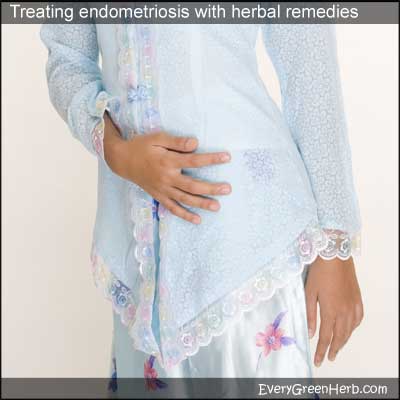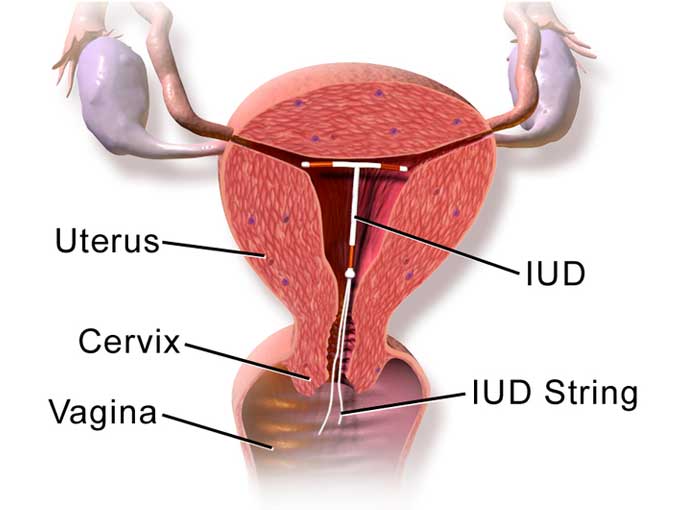Endometriosis herbs
Endometriosis can benefit greatly from herbal medicine.
 This
woman with endometriosis treats
her painful symptoms with herbal remedies - photo by Dreamstime.
This
woman with endometriosis treats
her painful symptoms with herbal remedies - photo by Dreamstime.
Treating endometriosis with medicinal herbs, essential oils, and home remedies
Endometriosis is a painful disorder that affects at least 10% of the women in the United States. Diagnosis is not usually made until a woman seeks help for fertility problems or severe pelvic pain.
Women with endometriosis have normal tissue that grows in abnormal places. Uterine tissue dislodges from the uterus and moves into other places in the body. Exact causes for endometriosis are unknown.
Endometriosis can cause serious health problems.
Endometriosis is a condition where renegade uterine tissue attaches itself onto the ovaries, the intestines, or even the lungs and brain (although this is extremely rare.) Although the uterine tissue has moved, it still responds to hormonal changes by shedding a layer of blood every month (just like the uterus).
This waste blood that should be flowing out of the body via the vagina doesn't have an outlet and causes serious problems.
Endometriosis can be relieved with herbs.
There are no quick fixes for endometriosis but by building up immunity and addressing hormonal imbalances much can be done to help.
Take immune building herbs like astragalus and echinacea on a regular basis. Red clover tea can help balance hormones.
Try ginseng, yellowroot, echinacea, and astragalus.
To fight endometriosis, herbs that build up the immune system should be taken on a regular basis over a period of months and years. Ginseng, yellowroot, echinacea, and astragalus are all good for this purpose.
Switch around so you don't build up immunity to one specific herb.
No one knows what causes endometriosis.
Causes of endometriosis are currently unknown but studies suggest various contributing factors including excess estrogen, progesterone deficiency, venereal disease, magnesium deficiency, overuse of prednisone or steroid drugs, exposure to toxic chemicals, hypoglycemia, too many x-rays, high fat diet, constipation, dependence on IUDs for birth control, overuse of tampons, pelvic infections, excess amounts of caffeine, and heavy drinking could be partly to blame.
Diagram of IUD placement in uterus by Wiki Commons
Symptoms of endometriosis include heavy periods and sharp pain.
Women with endometriosis might experience heavy menstrual bleeding, prolonged menstrual cycles, sharp pain, nausea, swelling, fluid retention, irritable bowels, insomnia, fatigue, depression, headaches, and infertility.
Some women have all the symptoms and some women only one or two. Everyone is different.
Use valerian, bee balm and white oak bark for pain.
Sharp pain associated with endometriosis can be soothed with valerian or bee balm tea. Sip slowly and try to relax.
Other pain relievers like white willow bark work like aspirin without upsetting or irritating the stomach.
Cannabis and CBD oils can also help.
Use essential oils to treat endometriosis.
Adding 15 drops of rosemary essential oil to a warm bath can help stop pain associated with endometriosis.
Many essential oils are useful in the treatment of endometriosis. Geranium essential oil, clary sage essential oil, angelica essential oil, oregano essential oil, chamomile essential oil, and thyme essential oil may help.
Use essentail oils in massage, bath, and aromatherapy.
Balance hormones with burdock, nettle, blackberry leaf, wild yam, or chasteberry.
Balance excess hormones with red clover, burdock, nettle, blackberry and raspberry leaf, wild yam, or chasteberry tea. Chasteberry is usually included in the treatment of any menstrual problem and has been used by women for thousands of years due to its estrogen balancing properties.
Herbal recipe to help balance female hormones
A good blend to try is 1 teaspoon of dried chasteberry, 1 teaspoon of dried Echinacea root, 1 teaspoon of wild yam, 1 teaspoon of cramp bark, 1 teaspoon of blackberry leaf, and ½ teaspoon of motherwort. Simmer in a quart of water for 15 minutes. Strain and drink four to six ounces several times per day.
Diagnosing endometriosis
In this video, NICHD infertility expert Dr. Esther Eisenberg discusses recent research to help diagnose endometriosis in women:
Try massage for endometriosis pain.
Pain can often be relieved with a gentle massage. Use lavender or rosemary essential oil in an almond oil base and rub in large circular motions over the abdomen and upper thighs.
Other tips for treating endometriosis
Reducing body fat and eliminating caffeine should be top priority. Exercise and get a little early morning sunshine daily. Don't forget to try different herbal treatments including black cohosh, dandelion leaf, ginger, evening primrose oil, borage oil, and milk thistle seed in tea or tincture form.
*Licorice should not be used for over four weeks without medical supervision. People taking dopamine related medications should avoid chasteberry. Always consult with a healthcare professional before using any herbal remedies especially when pregnant, nursing, or taking prescription medications. Never take any herbal remedies in early pregnancy without consulting your healthcare professional.
Sources:
https://www.ncbi.nlm.nih.gov/pmc/articles/PMC6637095/
Blessings to you and yours!
Thanks so much for reading my blog. Jan.

*Note - the information on this website has not been evaluated by the Food and Drug Administration.
© 2005-2024 website design and content by Janice Boling
